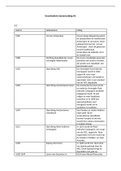College aantekeningen
Contract Law
Notes on the chapter of "Law of Contract" additional final questions to test your knowledge and a quick final resume capturing the essential points of the chapter. Impossible to not understand the chapter after reading these notes!
[Meer zien]












